★★½
“Sweet but mostly sour.”
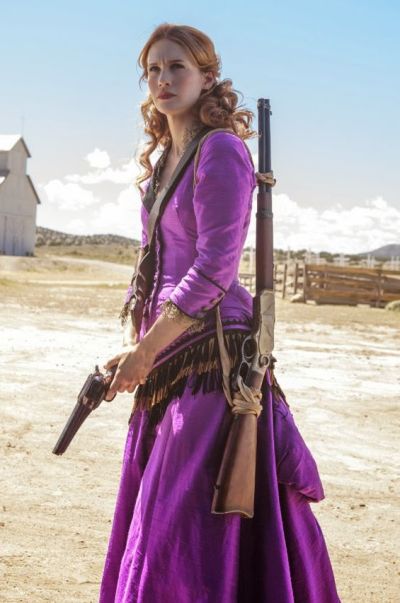 Life in the old West was tough. It was particularly tough if you were a woman, such as Sarah Ramírez (Jones), struggling to make an honest living with her farmer husband Miguel (Noriega), having escaped life as a prostitute. This movie shows it to be especially tough, after Miguel has had his throat slit by batty preacher Prophet Josiah (Isaacs) – it doesn’t help he has the hots for Sarah, apparently taking the “love thy neighbour” line very literally, and runs the local area as if it were his own personal fiefdom. Fortunately, she has an unusual ally in Sheriff Jackson (Harris). The lawman shows up, looking for two people who disappeared on a journey which took them right across Josiah’s territory, and is about the only other person willing to stand up to the lunatic religious fringe. Finally, Sarah has had enough, and embarks on her vengeance against, not only Josiah, but anyone else who has wronged her, such as the shopkeeper who spied on her in his changing-room.
Life in the old West was tough. It was particularly tough if you were a woman, such as Sarah Ramírez (Jones), struggling to make an honest living with her farmer husband Miguel (Noriega), having escaped life as a prostitute. This movie shows it to be especially tough, after Miguel has had his throat slit by batty preacher Prophet Josiah (Isaacs) – it doesn’t help he has the hots for Sarah, apparently taking the “love thy neighbour” line very literally, and runs the local area as if it were his own personal fiefdom. Fortunately, she has an unusual ally in Sheriff Jackson (Harris). The lawman shows up, looking for two people who disappeared on a journey which took them right across Josiah’s territory, and is about the only other person willing to stand up to the lunatic religious fringe. Finally, Sarah has had enough, and embarks on her vengeance against, not only Josiah, but anyone else who has wronged her, such as the shopkeeper who spied on her in his changing-room.
That final clause kinda illustrates the main problem here: an unevenness of tone which veers between the deadly serious and the ludicrously comic. That’s even the case for some individual characters, particularly Jackson; one minute, he’s waltzing by himself in the town’s main street, the next he’s carrying out forensic analysis, decades ahead of its time. While an intriguing character, the movie might have been better off concentrating on him or Sarah: they may share a common enemy, yet they hardly share a scene until the end, where Jackson’s sole purpose appears to be to provide a second firearm for our heroine. As for the ending, “Is that it?” will likely be your reaction, though in the film’s defense, I sense the emptiness of revenge is part of the point: once you’ve taken it, bringing to an end something which has consumed your life, what then?
I enjoyed the performances here, however: Jones’s understated style works towards her, while Isaacs and Harris both put over an unhinged air of barely-repressed violence. There are some fine moments, depicting Sarah’s willingness to use any means necessary, luring two of Josiah’s men to their doom by bathing in a river [pics from the scene “leaked” out: in no way was this a shallow publicity grab, I’m sure…]. The look of the film is also well done, with good use made of the New Mexico landscapes, and as the picture above shows, the heroine’s colourful garb is an interesting contrast – must have been hot and uncomfortable as hell to film in that. But the good intentions aren’t enough to overcome the lurches in tone and content, and the result is, frankly, a bit of a mess.
Dir: Logan Miller
Star: January Jones, Jason Isaacs, Ed Harris, Eduardo Noriega
a.k.a. Sweet Vengeance or Sherif Jackson















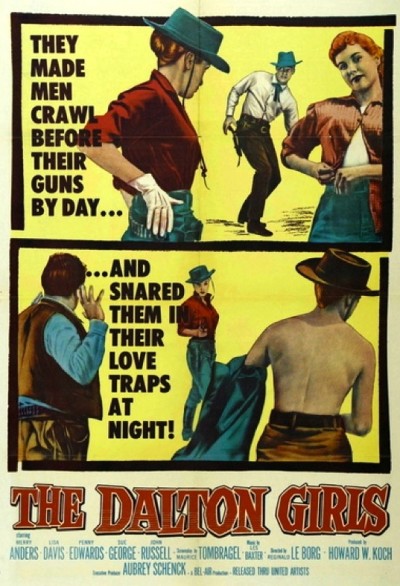
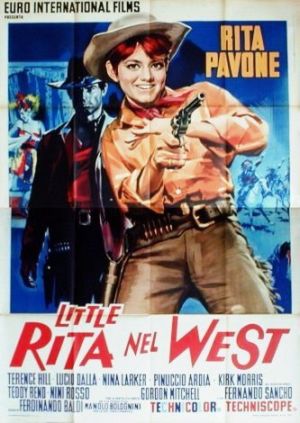 I came into this almost entirely blind, watching it based on the title and the first three minutes off YouTube. You can understand my surprise, after Rita (Pavone) and her German sidekick (Dalla) take out a gang of stagecoach robbers, finishing off by gunning one down in the back, as he lies dazed on the ground, when they… burst into song? Yep, what I didn’t know was, this is actually a musical, designed around the talents of Ms. Pavone, who was apparently a huge pop-star in Italy in the sixties. Hence the songs. Okay, that makes a bit more sense. But it’s still an extremely odd beast, swinging from obvious spoof to apparent seriousness at the drop of a catchy tune.
I came into this almost entirely blind, watching it based on the title and the first three minutes off YouTube. You can understand my surprise, after Rita (Pavone) and her German sidekick (Dalla) take out a gang of stagecoach robbers, finishing off by gunning one down in the back, as he lies dazed on the ground, when they… burst into song? Yep, what I didn’t know was, this is actually a musical, designed around the talents of Ms. Pavone, who was apparently a huge pop-star in Italy in the sixties. Hence the songs. Okay, that makes a bit more sense. But it’s still an extremely odd beast, swinging from obvious spoof to apparent seriousness at the drop of a catchy tune.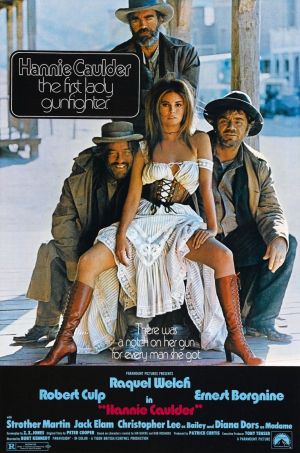 If genre entries produced in Italy are “spaghetti Westerns”, what does that make those produced in Britain? “Fish and chip Westerns?” “Roast beef Westerns?” Shot in Spain, but made by Tigon Film, and including such quintessential Brits as Christopher Lee and Diana Dors in supporting roles, this is nicely-photographed and hits all the right notes. But as the titular character, who seeks revenge after her husband is gunned down, and she herself raped, by the Clemens brothers, Welch perhaps has too much cinematic baggage. While responsible for one of the all-time absolute
If genre entries produced in Italy are “spaghetti Westerns”, what does that make those produced in Britain? “Fish and chip Westerns?” “Roast beef Westerns?” Shot in Spain, but made by Tigon Film, and including such quintessential Brits as Christopher Lee and Diana Dors in supporting roles, this is nicely-photographed and hits all the right notes. But as the titular character, who seeks revenge after her husband is gunned down, and she herself raped, by the Clemens brothers, Welch perhaps has too much cinematic baggage. While responsible for one of the all-time absolute 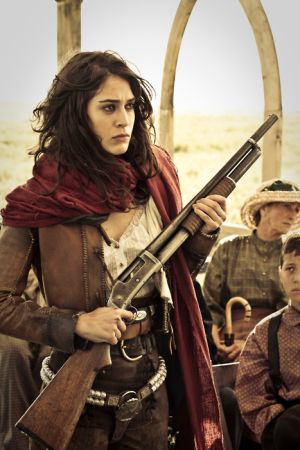 Though nominally a Western, this perhaps has more in common with the surreal works of Alejandro Jodorowsky, in particular El Topo, with mystical elements and downright weirdness. Ransom Pride (Scott Speedman, from the Underworld series) is killed in a gun-battle while trying to broker an arms deal with the locals. His corpse is kept by the local bruja, or witch (de Pablo), because her brother also died in the fight, shot by Ransom. That doesn’t sit well with his lover, Juliette (Caplan), a half-breed who has been raised in blood since slitting the throat of the Mexican general who killed her parents, while still not yet a teenager. She returns to Ransom’s home, and recruits his brother (Foster) to help recover the body, on the way back to Mexico, meeting a bevy of strange characters and situations. Their mission doesn’t sit well with the Pride patriarch (Yoakam), a gun-fighter turned preacher, who sets loose a pair of hunters, but is prepared to get his own hands dirty in pursuit of that “whore of Babylon.”
Though nominally a Western, this perhaps has more in common with the surreal works of Alejandro Jodorowsky, in particular El Topo, with mystical elements and downright weirdness. Ransom Pride (Scott Speedman, from the Underworld series) is killed in a gun-battle while trying to broker an arms deal with the locals. His corpse is kept by the local bruja, or witch (de Pablo), because her brother also died in the fight, shot by Ransom. That doesn’t sit well with his lover, Juliette (Caplan), a half-breed who has been raised in blood since slitting the throat of the Mexican general who killed her parents, while still not yet a teenager. She returns to Ransom’s home, and recruits his brother (Foster) to help recover the body, on the way back to Mexico, meeting a bevy of strange characters and situations. Their mission doesn’t sit well with the Pride patriarch (Yoakam), a gun-fighter turned preacher, who sets loose a pair of hunters, but is prepared to get his own hands dirty in pursuit of that “whore of Babylon.”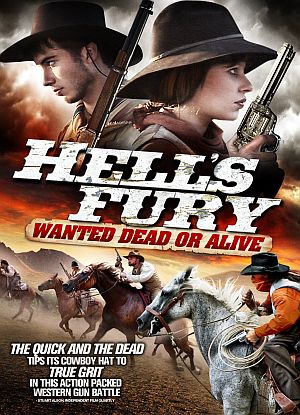 Eryn Cates (Hague) returns home to Texas from finishing school in New York, to find her family farm teetering on the edge of foreclosure [maybe if they hadn’t spent all that money to send her to finishing school in New York…]. In a misguided attempt to help things, her brother tries to rob a stagecoach carrying payroll, but is injured. The attempt fails, but local mogul Mortimer (Harris), who holds the loan on the Cates farm, sees a chance and pockets the loot. Two Texas Rangers, including the young and handsome Flint (Hagenbuch) show up to investigate the robbery, but it’s up to Eryn to save the family property, take on the mantle of the bandit, fend off the unwanted advances of Mortimer and engage in pseudo-romantic banter of the least interesting or convincing sort with Flint.
Eryn Cates (Hague) returns home to Texas from finishing school in New York, to find her family farm teetering on the edge of foreclosure [maybe if they hadn’t spent all that money to send her to finishing school in New York…]. In a misguided attempt to help things, her brother tries to rob a stagecoach carrying payroll, but is injured. The attempt fails, but local mogul Mortimer (Harris), who holds the loan on the Cates farm, sees a chance and pockets the loot. Two Texas Rangers, including the young and handsome Flint (Hagenbuch) show up to investigate the robbery, but it’s up to Eryn to save the family property, take on the mantle of the bandit, fend off the unwanted advances of Mortimer and engage in pseudo-romantic banter of the least interesting or convincing sort with Flint.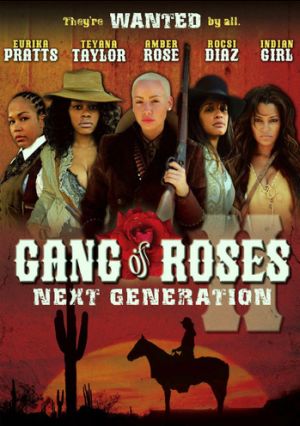 There are films which get a sequel because they’re successful. There are films which get a sequel because they are good. And then there’s a sequel to a film which was sub-mediocre, and appeared to vanish without causing even a ripple after its straight to video release in 2003. As a measure, nine years later, it hasn’t even reached 750 votes on the IMDB. Yet, we get this: a sequel that is neither needed, nor demanded by the public, and which manages to be even more boring and badly-constructed than its predecessor. Most movie-makers acquire at least a measure of technical skill as their career progresses, bur La Marre seems to have forgotten what little he knew a decade ago.
There are films which get a sequel because they’re successful. There are films which get a sequel because they are good. And then there’s a sequel to a film which was sub-mediocre, and appeared to vanish without causing even a ripple after its straight to video release in 2003. As a measure, nine years later, it hasn’t even reached 750 votes on the IMDB. Yet, we get this: a sequel that is neither needed, nor demanded by the public, and which manages to be even more boring and badly-constructed than its predecessor. Most movie-makers acquire at least a measure of technical skill as their career progresses, bur La Marre seems to have forgotten what little he knew a decade ago. If its predecessor (reviewed here as
If its predecessor (reviewed here as 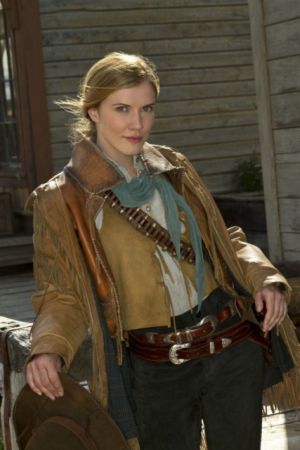 In 1866, the young child Hannah Beaumont (Canning, best known for her role in The Vampire Diaries) watches as the rest of her family is slaughtered by outlaw Frank McMurphy (Pyper-Ferguson). Twelve years later, Hannah is now getting her long-awaited revenge. Having been trained to shoot, ride and collect the bounty on wanted men by Isom Dart (Danny Glover in a small role), she is now reeling in the members of McMurphy’s gang, one by one. When McMurphy hears about this, he gathers up his entire posse and rides to Hannah’s base in Dodge City to finish off what he started, a decade before. Can Hannah – with the aid of the town’s deputy marshal, Wyatt Earp (Holt) and her other friends, come out on top?
In 1866, the young child Hannah Beaumont (Canning, best known for her role in The Vampire Diaries) watches as the rest of her family is slaughtered by outlaw Frank McMurphy (Pyper-Ferguson). Twelve years later, Hannah is now getting her long-awaited revenge. Having been trained to shoot, ride and collect the bounty on wanted men by Isom Dart (Danny Glover in a small role), she is now reeling in the members of McMurphy’s gang, one by one. When McMurphy hears about this, he gathers up his entire posse and rides to Hannah’s base in Dodge City to finish off what he started, a decade before. Can Hannah – with the aid of the town’s deputy marshal, Wyatt Earp (Holt) and her other friends, come out on top?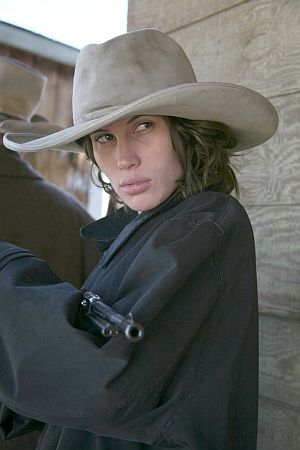 The Asylum studio are infamous for producing ‘mockbusters’ – straight to DVD look-alikes of big-budget movies, designed to benefit from their publicity budgets. These have included their own versions of Sherlock Holmes and War of the Worlds, but they do make their own original works, including cheesy delights such as Mega Python vs. Gatoroid, starring 80’s popsters Tiffany and Debbie Gibson. They come in for a lot of flak as a result – some justified, some not, for this is neither mockbuster nor cheesy, and is surprisingly solid, if you want a straightforward Western tale of revenge. Selina Stevens (Mears) has to watch as her husband and two young sons are killed by Lee Horn (Mead) and his gang; she is brutally raped and left for dead, beginning a decline into alcoholic despair. Having reached bottom, she meets bounty-hunter Frank Allison (Van Dyke), and asks him to teach her how to shoot – conveniently, just as Horn’s crew start to make their way back to town. The townsfolk’s repeated affirmations that they feel safer with Frank around, might have been a bit premature.
The Asylum studio are infamous for producing ‘mockbusters’ – straight to DVD look-alikes of big-budget movies, designed to benefit from their publicity budgets. These have included their own versions of Sherlock Holmes and War of the Worlds, but they do make their own original works, including cheesy delights such as Mega Python vs. Gatoroid, starring 80’s popsters Tiffany and Debbie Gibson. They come in for a lot of flak as a result – some justified, some not, for this is neither mockbuster nor cheesy, and is surprisingly solid, if you want a straightforward Western tale of revenge. Selina Stevens (Mears) has to watch as her husband and two young sons are killed by Lee Horn (Mead) and his gang; she is brutally raped and left for dead, beginning a decline into alcoholic despair. Having reached bottom, she meets bounty-hunter Frank Allison (Van Dyke), and asks him to teach her how to shoot – conveniently, just as Horn’s crew start to make their way back to town. The townsfolk’s repeated affirmations that they feel safer with Frank around, might have been a bit premature.